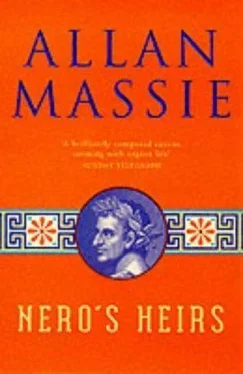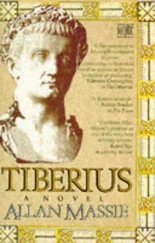Allan Massie - Nero_s Heirs
Здесь есть возможность читать онлайн «Allan Massie - Nero_s Heirs» весь текст электронной книги совершенно бесплатно (целиком полную версию без сокращений). В некоторых случаях можно слушать аудио, скачать через торрент в формате fb2 и присутствует краткое содержание. Жанр: Исторические приключения, на английском языке. Описание произведения, (предисловие) а так же отзывы посетителей доступны на портале библиотеки ЛибКат.
- Название:Nero_s Heirs
- Автор:
- Жанр:
- Год:неизвестен
- ISBN:нет данных
- Рейтинг книги:3 / 5. Голосов: 1
-
Избранное:Добавить в избранное
- Отзывы:
-
Ваша оценка:
- 60
- 1
- 2
- 3
- 4
- 5
Nero_s Heirs: краткое содержание, описание и аннотация
Предлагаем к чтению аннотацию, описание, краткое содержание или предисловие (зависит от того, что написал сам автор книги «Nero_s Heirs»). Если вы не нашли необходимую информацию о книге — напишите в комментариях, мы постараемся отыскать её.
Nero_s Heirs — читать онлайн бесплатно полную книгу (весь текст) целиком
Ниже представлен текст книги, разбитый по страницам. Система сохранения места последней прочитанной страницы, позволяет с удобством читать онлайн бесплатно книгу «Nero_s Heirs», без необходимости каждый раз заново искать на чём Вы остановились. Поставьте закладку, и сможете в любой момент перейти на страницу, на которой закончили чтение.
Интервал:
Закладка:
I still admired him, still felt a tenderness for him, no longer desired or loved him. I thought: this means only that I have grown up. I exchanged letters with Domatilla; hers were reticent, even banal. She said only one thing of note: that she accused herself of being the cause of my mother's death. I knew this not to be the case; nevertheless read in her words a growing distance between us. Other correspondents told me with what relish Domitian played the part of vice-Emperor, of how he boasted of his share in the Flavian triumph.
By Titus' side, I took part in the siege and capture of Jerusalem. I have written something of that already. Enough indeed: to dwell longer on it would give me nightmares, if sleep was not already denied me. We destroyed the temple of the Jews. I entered its Holy of Holies – and found it empty. I had supposed it would contain some revelation, some hint as to what the Jews believe to be the meaning and purpose of life.
Now I think that it may have done so: proclaiming that there is neither meaning nor purpose. Balthus disputes this; his loving god assures him of both. He still tries to convert me. I ward him off, telling him that the Christians being a proscribed sect, he is dependent on my ungodly protection. The irony escapes him. Perhaps I should supply him with a wife. When I suggested this, he shrank from the proposition. He finds female flesh and the smell of women repulsive. Strange. He is committed to chastity; there are some, he tells me, who have made themselves eunuchs for his Christ's sake.
I took part in the triumph granted to Titus and Vespasian. Ostensibly the Senate accorded them this honour on account of their victory in the Jewish War. In reality Vespasian himself demanded it, and knew that he was actually celebrating his seizure of Empire and the deaths of tens of thousands of his fellow-citizens, some on his behalf, others resisting his usurpation of power.
I rode on a bay horse alongside Domitian who was mounted on a white stallion. As we approached the Sacred Way, it shied and all but threw him.
At dawn Vespasian and Titus had emerged from the palace, both crowned with laurel and dressed in purple. They proceeded to the portico of Octavia, sister of the Divine Augustus and unhappy wife of Mark Antony. The Senate, magistrates, and leading equestrians waited for them there. Vespasian gave the signal for silence which, in a little, was obeyed. Then, covering his head with his cloak, he rose to mutter the immemorial prayers. They were almost inaudible, muffled by the cloak and his provincial accent. Titus repeated them after him, more clearly but no more comprehensibly, since these prayers are in an antique dialect that no one now understands. I later asked Titus whether he had enquired of the priests if they could furnish him with the meaning of the words he had spoken. He laughed: 'Dear boy, what does it matter?'
Having recited the prayers, they assumed their triumphal robes and sacrificed to the gods, and then commanded the procession to be set in motion. They rode together in a chariot, and Domitian and I were in the first rank behind them. The spectacle was magnificent. That was undeniable. No expense had been spared, and the war was depicted in numerous ingenious representations.
Now you saw a prosperous country, far more fertile than Palestine, being laid waste. Now there were scenes showing whole armies of the enemy being slaughtered – armies far more formidable and better equipped than the miserable Jews had been – there they were shown in flight, there being led in chains into captivity. There were shows of cities and their defenders being overcome by the legions swarming the ramparts and walls. Blood was seen to flow, wretches raising their hands in surrender or supplication. Temples were fired, houses tumbled, and rivers flowed across a land given over to devastation, burning wherever you looked.
It was, I suppose even now, superb; and the message was clear. This was the full terror of war from which Vespasian and Titus had rescued Rome and Italy.
Conspicuous above all else were the spoils of the temple of Jerusalem: golden vessels, golden tables, golden candelabra, and tablets inscribed with the laws of the defeated and despised Jews. Images of victory in gold and ivory were displayed, as the triumphal procession wound its way to the not yet restored Temple of Capitoline Jupiter. Vespasian, I was amused to note, wriggled with boredom. 'What an old fool I was,' he muttered, 'to demand a triumph.'
But Titus delighted in every moment of the day. Domitian looked sour and sulky.
We waited before the temple till a messenger came, as was customary, from the Mamertine prison, to announce that the enemy general had been executed.
This was a lie. No enemy general had been taken. But the people, being ignorant of this, were content.
For the eight years of Vespasian's reign I was seldom in Rome. I pursued a military career on distant frontiers, mostly in Anatolia where rebellion was endemic. I was wounded three times, decorated for bravery, and in action stifled thought. I had not yet learned to distrust Titus' nobly-spoken dream of Empire. I believed that strenuous service in warfare, and my work in securing just administration of the conquered provinces could allow me to forget the stench of corruption in Rome itself. I did not realise that I was already infected with its germ.
My correspondence with Domatilla withered. How could it be otherwise? Then she was married. Her husband was a man who had been an associate of Nero. Now he paid court to Caenis, Vespasian's low-born mistress. She promoted the match, hoping that by doing so she could secure her position of power and influence for the future, when Vespasian was no more. Vespasian could deny her nothing; he consented to the marriage, and Domatilla had no choice but to obey. As for me, there was no shortage of women in Anatolia, Circassian slave-girls who delighted the senses and made no demands on my heart.
Vespasian died, hauled upright, because, as he said, 'An Emperor should die on his feet.' He was the first Emperor since the Divine Augustus to die a natural death; all the others were either murdered or, in Nero and Otho's case, committed suicide. Titus inherited, the first true-born son of an Emperor to do so. He abandoned the pretence, which Vespasian had honoured, of being merely, as Augustus had styled himself, the 'Princeps' or 'First Citizen'. My boyhood lover was happy to be addressed as 'God and Lord'. If Galba's accession had proved that an Emperor could be made elsewhere than in Rome, now Titus tore the facade of Republican respectability to shreds. Some were afraid; they said he would prove a second Nero, on account of his addiction to pleasure.
But, unlike Nero, Titus revelled in the business of Empire. Administration delighted him. He had an eye to his own security, himself retained command of the Praetorians, flattered them, rewarded them lavishly. He enforced obedience and good conduct in the State. Detachments of the Guard habitually arrested any suspected of disloyalty or disaffection. Such arrests were often made in public places, like the theatre; this was an effective means of instilling fear and respect for the imperial power. Executions were summary, without the formality of trial.
Titus brought me home, appointed me his deputy commander of the Guard. So he joined me with him in illegality. Yet at the same time we won the favour of the people by proceeding against the unpopular public informers, always ready, for payment, to bring accusations against their fellow-citizens. I took pleasure in ordering several to be whipped and deported from Rome. In this way, combining severity with what I privately regarded as the politics of gesture, Titus won for himself a popularity denied any Emperor since Augustus.
So Titus charmed the people while suppressing sedition in the State. For a little it seemed as if the sun had broken through the dark clouds that had shrouded Rome.
Читать дальшеИнтервал:
Закладка:
Похожие книги на «Nero_s Heirs»
Представляем Вашему вниманию похожие книги на «Nero_s Heirs» списком для выбора. Мы отобрали схожую по названию и смыслу литературу в надежде предоставить читателям больше вариантов отыскать новые, интересные, ещё непрочитанные произведения.
Обсуждение, отзывы о книге «Nero_s Heirs» и просто собственные мнения читателей. Оставьте ваши комментарии, напишите, что Вы думаете о произведении, его смысле или главных героях. Укажите что конкретно понравилось, а что нет, и почему Вы так считаете.












